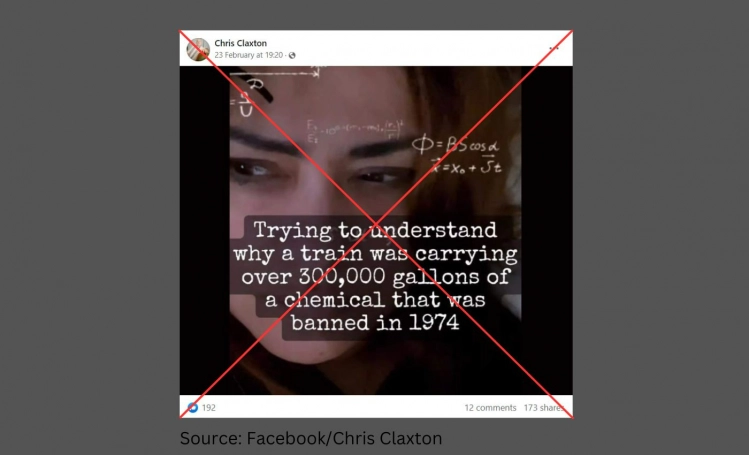By: Chandan Borgohain
March 3 2023

Vinyl chloride is only banned in aerosol products, and official data shows the train was carrying far less than 300,000 gallons of this chemical.
Context
On February 3, 2023, 38 cars of a Norfolk Southern Railway freight train derailed in East Palestine, Ohio. In a preliminary report issued on February 23, the National Transportation Safety Board (NTSB) stated that 11 of the 38 derailed train cars were "carrying hazardous materials that subsequently ignited" and fuelled fires that damaged an additional 12 train cars that had not derailed. It added that the hazardous chemicals included vinyl chloride, an industrial gas primarily used in the production of PVC. While federal agencies have given the air and water in the area a clean bill of health, the incident has left residents concerned about breathing fumes released into the air and exposure to contaminated water.
Against this context, claims are circulating on social media that the train was carrying "over 300,000 gallons" of vinyl chloride, allegedly banned since 1974. A viral Facebook post with text overlaid on an image reads, "Trying to understand why a train was carrying over 300,000 gallons of a chemical that was banned in 1974."
In Fact
While the U.S. Consumer Product Safety Commission (CPSC) issued a ban on vinyl chloride in 1974, this was specifically only for aerosol products due to "public health and safety" concerns. The commission, in its order, states, "Vinyl chloride has been linked by scientific studies and clinical reports to a rare form of liver cancer. Although there is no evidence directly linking cancer to the use of aerosols containing vinyl chloride, consumers are always subject to inhalation of the substance whenever they use aerosols that contain it. And there is no known safe exposure level." The commission said that the ban was imposed on most aerosol products, such as paints, decorative coatings, paint removers, adhesives, and solvents containing vinyl chloride.
Vinyl chloride is, however, still in use in the U.S., primarily in the production of polyvinyl chloride, also known as PVC, which is used to make a variety of plastic products, including pipes, wire and cable coatings, and packaging materials. According to a public health statement released in July 2006 by a federal public health agency within the U.S. Department of Health and Human Services, the "production of vinyl chloride in the United States grew at an average rate of about 7 percent from the early 1980s to the early 1990s" and continued to grow at the annual rate of 3 percent as of 2006.
The viral posts also claimed that the derailed train was carrying over 300,000 gallons of vinyl chloride. However, official data does not support this claim. According to a preliminary report issued by the NTSB on February 23, five cars in total were carrying 115,580 gallons of vinyl chloride.
The Environmental Protection Agency (EPA) states that as of February 18, approximately 1,557,000 gallons of liquid waste have been collected from the site, of which 247,000 gallons were already transported for disposal by February 17. This includes other chemicals present on the train, such as ethylene glycol mono butyl ether, isobutylene, benzene, butyl acrylate, phosgene, and hydrogen chloride.
The Verdict
Vinyl chloride was banned in aerosols in 1974 in the U.S. but remains in use otherwise in the production of PVC. Further, according to official data, the train was carrying 115,580 gallons of vinyl chloride, not 300,000 gallons. Therefore, we have marked this claim as misleading.